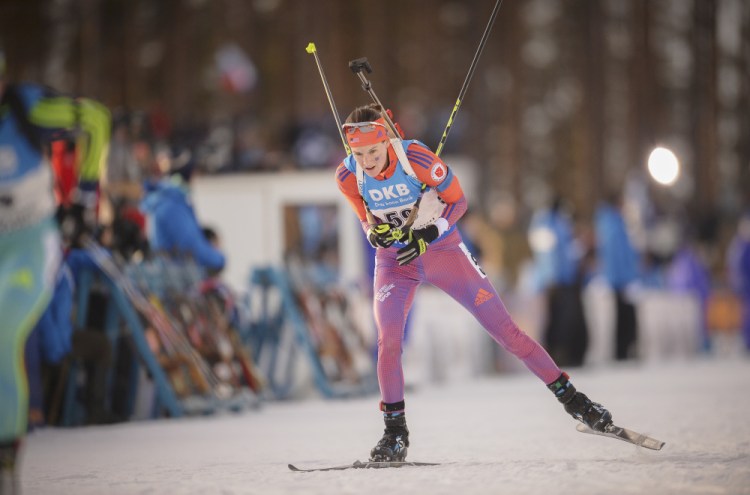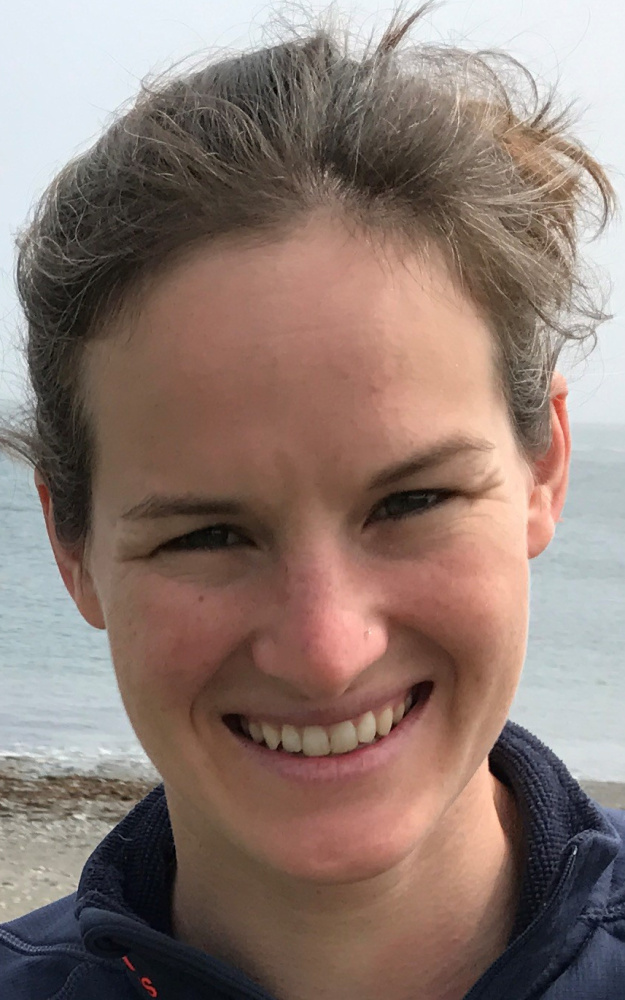CAPE ELIZABETH — The net stretched invitingly across her yard, but Clare Egan had no time to swat shuttlecocks on a foggy morning.
“I love badminton,” she said, pronouncing the word as it is spelled, unlike so many of us do.
Then again, Egan has a master’s degree in linguistics and precision comes in handy in her line of work, which involves shooting small targets with a .22-caliber rifle.
She can speak five languages and is learning a sixth, Korean. That will come in handy next February if, as expected, she finds herself in PyeongChang for the 2018 Winter Olympics as a member of the U.S. Biathlon Team.
“In some ways, it’s hard to believe that it’s here already,” Egan said of the Olympic training cycle that began last month. “In other ways, it’s hard to believe that it’s the 2018 Olympics we’re talking about.”
Indeed, Egan will turn 30 in November. At Cape Elizabeth High, she was a runner and Nordic skier and if an Olympic thought crossed her mind, it was, “Maybe I’ll go to Vancouver in 2010.”
Of course, that dream didn’t involve a rifle. She was a cross-country skier at a college (Wellesley) that had no varsity program and only offered it as a club because Egan started one. She had barely dabbled in biathlon before the 2014 Olympic Trials and didn’t make her World Cup debut until January 2015.
Currently, however, Egan is ranked second in the country among women and almost a shoo-in to be among the five female biathletes selected for the U.S. Olympic Team.
“She is very well-positioned to make the Olympic team next year,” said Max Cobb, head of U.S. Biathlon, by phone from his office in New Gloucester. “Her progress has been terrific. She has improved her skiing tremendously. Seeing her compete this winter, she looked like a totally different athlete than last winter. That’s a credit to her hard work and training.”
Only one U.S. woman and one man have secured Olympic berths. Susan Dunklee and Lowell Bailey won silver and gold at the 2017 World Championships in Austria in February. Biathlon is the only Winter Olympics sport in which the United States has never medaled.
Dunklee, a Vermonter, finished the season 10th in World Cup rankings with Egan 56th and Joanne Reid of Colorado 84th. No other U.S. woman scored World Cup points last winter.
Egan’s best performance came at World Championships. She hit all 10 targets in the 7.5-kilometer Sprint and placed 20th, dropped 18 of 20 in the 15K Individual to place 22nd, took 41st in Pursuit and for the first time, earned one of only 30 berths in the Mass Start, where she placed 24th.
“I’m in a good spot,” Egan said. “But I need to stay healthy and not get injured and, of course, keep working and making forward progress.”
The 2017-18 World Cup schedule begins in late November in Sweden. There will be three competitions before Christmas and three more before the Olympics. At least one, and possibly two more women will be named to the team by Christmas, with a top-30 finish punching her ticket. If that doesn’t happen, whichever woman, aside from Dunklee, has the single best World Cup placement from those three early competitions will qualify.
“My goal at this point is to be that person who gets named to the team in December,” Egan said. “I want to be on the early end of that.”
Another Mainer, Russell Currier of Stockholm, is one of six men on the National Biathlon Team roster. He is a veteran of the 2014 Sochi Games and is vying for one of five spots in PyeongChang.
“I am so thankful that we do not do what track and field does, and what a lot of sports do, which is have one race where you have to get in the top three,” said Egan, who watched online last summer as North Yarmouth native Ben True – two years ahead of her in school – fell just shy of qualifying for the Rio de Janeiro Olympics at 5,000 and 10,000 meters. “We’ll have probably nine races over three World Cups, so I have a lot of chances. If I get sick, it’s not like having a cold on one day is going to ruin my chances.”
In the distance, a foghorn blew. Egan had returned to Cape Elizabeth for the wedding of two high school friends. She stayed out past midnight.
“I feel sleep deprived now,” she said. “I’m so used to getting my nine and a half hours of sleep and maintaining a perfect regime of exercise and nutrition so even something as simple as staying up late, part of my job is to not do that.”
Last year she missed two weddings. This September, she’s skipping a training camp in Germany in order to attend a high school friend’s wedding. She has learned she needs a balance between work and life.
“I hate training camps, because it’s the epitome of imbalance,” she said. “People who really thrive on eat-sleep-train – and a lot of elite athletes are that way – they do great, and I just … .”
She paused.
“I mean, I was depressed for the first time in my life after that camp (last September),” she said. “I couldn’t even get myself out the door when I got home from that, I was so exhausted and mentally and physically burned out.”
So this time she’s staying in Lake Placid, where she raises vegetables in a community plot and lives in an apartment rather than at the Olympic Training Center. Bailey, who earned that World Championship gold medal last winter at age 35 after considering retiring from the sport, also plans to remain in New York with his wife, Erika, and baby, Ophelia.
Egan said having Erika and Ophelia on tour last winter did wonders not only for Bailey but for everyone else on the team. Whenever Egan returned from a frustrating shooting session, she could “use the team baby,” she said. “It was such an obvious shift of perspective.”
It also got her thinking about a future beyond the Olympic games. Yes, she’s thought about starting a family of her own.
“That’ll be my next chapter,” she said, “but luckily I have a partner who is the right person for that.”
Erik Lewish, the assistant team director for U.S. Biathlon, shares an apartment with Egan. He understands the demands of training and travel and how maddening the sport can be. He also understands the lure of earning what could be the first medal in U.S. Olympic biathlon history.
“That’s what’s so cool about biathlon,” Egan said. “You hit all your targets and you do it fast and then you ski well, you can medal. Crazy things happen at the Olympics. People who are not often on the podium do end up on the podium.”
If she’s there, she certainly will be an underdog. But in a mixed relay with Dunklee and Bailey and one other man, perhaps Tim Burke?
“The mixed relay is a great medal possibility for us,” Cobb said. “We have some depth there, but I think Clare is a really strong candidate.”
Send questions/comments to the editors.




